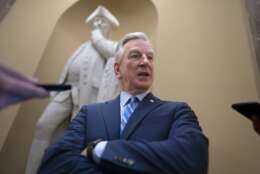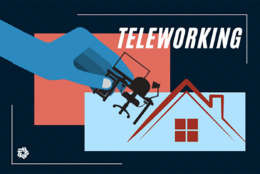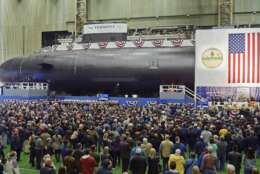Tom Temin
-
The U.S. Agency for International Development operates throughout the world, but all its work is local. It's been on a drive to concentrate more contract and grant dollars to organizations in the countries where a project is occurring. At USAID, they call that localization.
July 25, 2023 -
In today's Federal Newscast, military spouses call on Senator Tommy Tuberville of Alabama to end his block on Senate confirmed military appointments.
July 25, 2023 -
The National Geospatial Intelligence Agency is about, well geography of course. And data. And now it's about artificial intelligence.
July 24, 2023 -
In today's Federal Newscast, a government contractor agrees to pay one of the biggest fines in the history of the False Claims Act.
July 24, 2023 -
The Small Business Administration might be a small agency but it has outsize influence over the economy. The pandemic highlighted shortcomings in the SBA, including constituents' access to credit, customer service, and entrepreneurial development. That's according to a task force convened by The Bipartisan Policy Center. And it has a list of recommendations for reform.
July 24, 2023 -
This week Congress is hard at work on spending bills for 2024. It's the last work week before the August recess, as the fiscal year rushes towards Sept. 30.
July 24, 2023 -
No American would stand on a soapbox and shout out how easy it is to deal with the federal government. A small office deep within the White House apparatus has been coaxing agencies to reduce what's officially known as administrative burden on citizens.
July 21, 2023 -
The Defense industrial base is always a concern for the Pentagon. It worries both about capacity and whether it has a competitive market. That's why planners keep an eye on mergers and acquisitions aka M&A.
July 21, 2023 -
In today's Federal Newscast: The Partnership for Public Service announces its 2023 People’s Choice Award winner. The electric vehicle commitment of federal agencies has just be supercharged. And the teleworkers at the Federal Aviation Administration, have just begun their descent toward the in-office tarmac.
July 21, 2023 -
The 2003 crash of the Space Shuttle Columbia sparked big changes at NASA. That's when its Engineering and Safety Center got established, in order to provide safety oversight and a culture more attuned to safety.
July 20, 2023 -
The push and pull over how much feds should return to the office seems headed to a grudging settlement.
July 20, 2023 -
It only took six years, but now the Homeland Security Department has new regulations covering how contractors must handle CUI, controlled, unclassified information.
July 20, 2023 -
The Navy's carriers and submarines might be the most technically sophisticated in the world. But they're also the most expensive.
July 20, 2023 -
In today's Federal Newscast: Microsoft will soon give it away for the sake of cybersecurity. The Office of Personnel Management is drafting new qualification standards for federal wildland firefighter management jobs. And the Air Force embeds recruiters in the Hinterlands to find new cadets.
July 20, 2023 -
An old saying goes like this: "If it moves, tax it. If it moves too fast, regulate it. If it stops moving, subsidize it." Well, Artificial Intelligence is in that fast-moving stage, but no one seems to quite have any sense of how or even why to regulate it.
July 19, 2023















